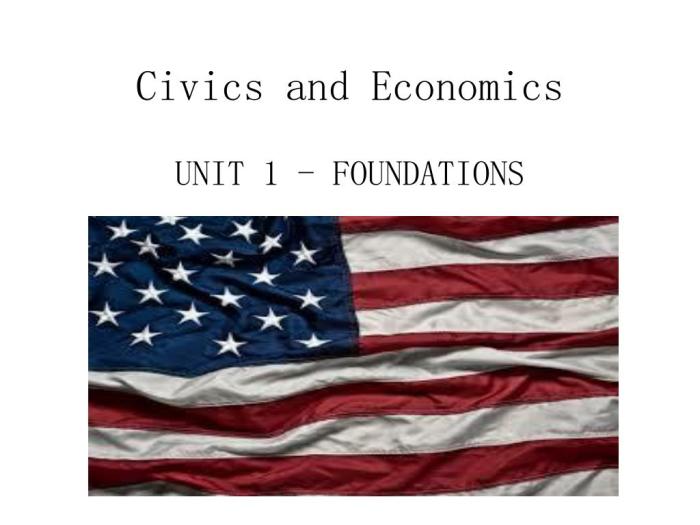Building citizenship civics and economics pdf – Welcome to the definitive guide to building citizenship, civics, and economics knowledge! This comprehensive PDF resource delves into the fundamental principles of citizenship, the intricacies of civics, and the complexities of economics, empowering you with the tools to navigate the responsibilities and privileges of modern society.
Throughout this guide, we will explore the concept of citizenship, examining the rights and responsibilities that come with it. We will also delve into the realm of civics, unraveling the different branches of government and their functions, as well as the vital role citizens play in a democratic society.
Citizenship

Citizenship refers to the legal and political status of an individual within a nation-state. It involves a set of rights and responsibilities that define the relationship between the individual and the state.
Rights of Citizens, Building citizenship civics and economics pdf
Citizenship typically grants individuals certain fundamental rights, including:
- The right to vote and participate in the political process
- The right to equal protection under the law
- The right to freedom of speech, assembly, and religion
- The right to a fair trial
Responsibilities of Citizens
In exchange for these rights, citizens also have certain responsibilities, such as:
- The responsibility to obey the laws
- The responsibility to pay taxes
- The responsibility to serve on juries
- The responsibility to participate in civic life
Civics: Building Citizenship Civics And Economics Pdf
Civics is the study of the rights and responsibilities of citizens. It encompasses knowledge of government, law, and political systems.
Branches of Government
In a democratic society, the government is typically divided into three branches:
- The legislative branch, which makes laws
- The executive branch, which enforces laws
- The judicial branch, which interprets laws
Role of Citizens in a Democratic Society
Citizens play a crucial role in a democratic society by:
- Voting in elections
- Running for office
- Serving on juries
- Participating in civic organizations
- Staying informed about current events
Economics
Economics is the study of how societies produce, distribute, and consume goods and services.
Basic Principles of Economics
Some basic principles of economics include:
- Scarcity: Resources are limited, so choices must be made about how to allocate them.
- Supply and demand: The price of a good or service is determined by the interaction of supply and demand.
- Opportunity cost: Every decision involves a trade-off, as resources used for one purpose cannot be used for another.
Economic Systems
There are different types of economic systems, each with its own advantages and disadvantages. Some common economic systems include:
- Capitalism: A system in which private individuals and businesses own and control the means of production.
- Socialism: A system in which the government owns and controls the means of production.
- Mixed economy: A system that combines elements of both capitalism and socialism.
Impact of Economic Policies
Economic policies can have a significant impact on citizens. For example, policies that increase the minimum wage can benefit low-income workers, while policies that reduce taxes can benefit businesses and investors.
General Inquiries
What is the significance of citizenship?
Citizenship bestows upon individuals a sense of belonging and identity within a nation, along with the rights and responsibilities associated with that membership.
How does civics education contribute to society?
Civics education fosters an understanding of government structures and functions, equipping citizens with the knowledge and skills necessary for active participation in their communities.
What is the role of economics in shaping public policy?
Economics provides a framework for analyzing and addressing societal issues, informing policymakers’ decisions on resource allocation, taxation, and other matters that impact citizens’ well-being.